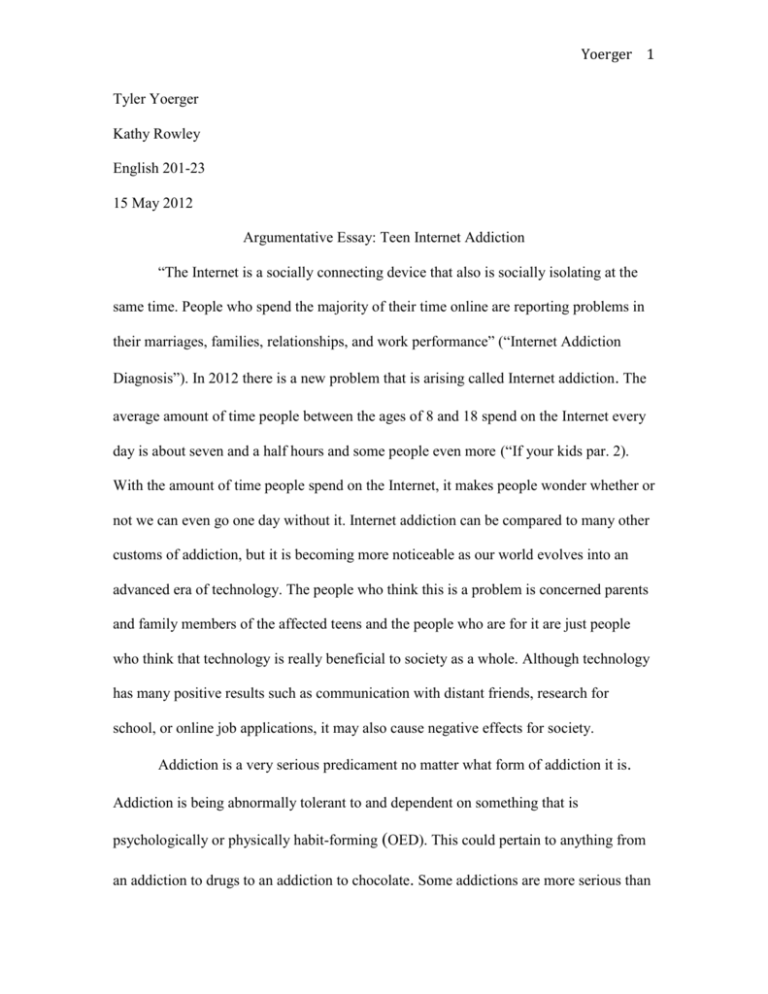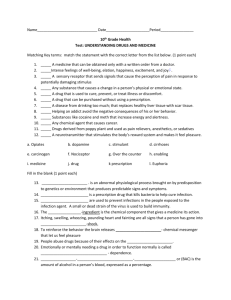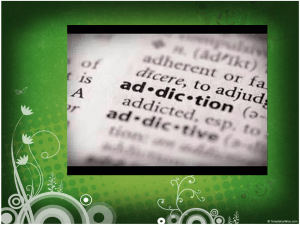
Yoerger 1
Tyler Yoerger
Kathy Rowley
English 201-23
15 May 2012
Argumentative Essay: Teen Internet Addiction
“The Internet is a socially connecting device that also is socially isolating at the
same time. People who spend the majority of their time online are reporting problems in
their marriages, families, relationships, and work performance” (“Internet Addiction
Diagnosis”). In 2012 there is a new problem that is arising called Internet addiction. The
average amount of time people between the ages of 8 and 18 spend on the Internet every
day is about seven and a half hours and some people even more (“If your kids par. 2).
With the amount of time people spend on the Internet, it makes people wonder whether or
not we can even go one day without it. Internet addiction can be compared to many other
customs of addiction, but it is becoming more noticeable as our world evolves into an
advanced era of technology. The people who think this is a problem is concerned parents
and family members of the affected teens and the people who are for it are just people
who think that technology is really beneficial to society as a whole. Although technology
has many positive results such as communication with distant friends, research for
school, or online job applications, it may also cause negative effects for society.
Addiction is a very serious predicament no matter what form of addiction it is.
Addiction is being abnormally tolerant to and dependent on something that is
psychologically or physically habit-forming (OED). This could pertain to anything from
an addiction to drugs to an addiction to chocolate. Some addictions are more serious than
Yoerger 2
others but no addiction should be ignored. Some of the most common addictions are
drug, alcohol, gambling, and Internet addiction. When someone becomes addicted to
something they will go to great lengths to get whatever it is that they are addicted to. This
causes behavioral problems with the individuals who are affected by addiction and it
could possibly cause problems with the people that are affiliated with the addict. Teens in
particular are a big target when it comes to Internet addiction.
Teens and adolescents are the biggest targets when it comes to addiction on the
Internet. We are doing things on the Internet now that just blows people’s minds. Just a
few short years ago, Internet capable gadgets were very large and weighed a lot but now
their small enough to fit in your hands. You can talk to people on the Internet that are six
thousand miles away and it’s free to do so. People can play live video games with other
people who are across the globe and it’s really just a phenomenal thing we have today.
There are different things that you can do with the Internet today. One of the main
things people use it for is online gaming. There are many varieties of games that are
compatible with online gaming. Computer and console games are the things that are
getting people addicted and changing their lives. The people who are most affected by
this is adolescents. The adolescent kids find that the games put them in an intoxicating
state of mind and all they want is more and more games and that leads to them becoming
more and more addicted to the online video games. According to Peter Holtz and Markus
Apple, “Online gaming, communicational internet use, and playing first-person shooters
were predictive of externalizing behavior problems (aggression, delinquency) (par. 1).”
Yoerger 3
For example, these kids could play the games and something could go wrong. Anything
from them having a bad game to there parents telling them that it was time for them to get
off and it would cause some serious aggression. The aggression is part of the behavioral
problems that Holtz and Apple explained. With the aggression comes the delinquency.
Any number of illegal actions (like theft and substance abuse) can sprout from aggression
and delinquency when dealing with the adolescent kids and teens, which is why this form
of addiction is such a problem.
One growing form of Internet addiction is gambling. Different types of Internet
gambling could include online poker, fantasy baseball, fantasy football, and fantasy
basketball. This type of addiction has been growing for the past few years. Its target area
of people is also adolescence. In the article “Internet Gambling, Substance use, and
Delinquent Behavior: An Adolescent Deviant Behavior Involvement Pattern”, they do a
study on how Internet gambling affects adolescence. Their ending result of the study was
that a higher portion of the Internet gambling students reported problematic use of illegal
substances and delinquency. Also a higher portion of at-risk and probable pathological
gamblers is found among the Internet gamblers versus the non-internet gamblers
(Brunelle). They might try out the whole Internet gambling scenario and end up winning
once or twice. Once they have won a few times they start to develop a feeling of
satisfaction. Then they end up putting more money in to Internet gambling and then
eventually they become addicted and end up getting in to serious trouble. If they lose a
lot, they can build up some serious antagonism, which could lead to the substance abuse
or delinquency.
Another form of Internet addiction is Internet pornography addiction. This is men,
Yoerger 4
women, and teens going on to adult websites to satisfy their sexual needs. In the article
“Sexual Violence in Three Pornographic Media: Toward a Sociological Explanation,”
they explain that pornographic websites and media use violence in their ads and
pornographic material that effects men’s attitudes and how they use violence toward
women. (Barron, Paragraph 1 and 3) The violence portrayed on these websites ruins
men’s attitude and respect toward women. In this study, it compared violence in video,
magazine, and Usenet. Out of all of these the Usenet video’s had the highest amount of
sexual violence or aggression. The reason that the Usenet video’s had the most sexual
aggression is because it is significantly cheaper to produce a pornographic video than it is
to have a photo shoot for pornographic images. The resources for these videos are so easy
to find on the Internet that adults and teens become addicted to them really fast. There
are so many free websites out there and people think they need to visit them to fulfill
their sexual needs and the next thing you know it becomes an everyday thing and they
become addicted. With this addiction come effects on the teens like imitation of
inappropriate behaviors; unhealthy interference with normal sexual development;
emotional side effects (including nightmares, and residual feelings of shame, guilt,
anxiety and confusion); stimulation of premature sexual activity; and the development of
misleading and potentially harmful attitudes toward sex (“Teenagers and Pornographic
Addiction”).
Out of all of the ways that teens are addicted to the Internet, there is one way that
a majority of them are addicted and that is through a social media on the Internet. "I don't
think anyone could have designed a more addictive device than the Internet," said Dr
Yoerger 5
Nahmeldeen al-Falahe, a consultant psychiatrist at the Priory Hospital in the UK (Renee
Lewis). There are so many different social networking sites on the Internet today. Some
social networks range from just posting status updates to only posting pictures. The
biggest targets for the social network addiction on the Internet are adolescent teens. They
are the biggest targets because it’s a way for all the kids to catch up on the latest drama at
school. It all starts with the person making an account on the website, which is free, and
then it just gets worse from there. They find out some juicy information about other kids
at their school and then they want to find out more so they become addicted and seek out
the information. In the article “Facebook Rehab” the author Renee Lewis speaks of a
study that was done on some students where they disconnected them from social media
on the Internet. This was the outcome of the study: “While disconnected, students
complained of feeling depressed, lonely, bored and less focused. They also complained of
physical withdrawal symptoms such as headaches, feeling fidgety and hearing phantom
ringing.” (par. 7) Another thing they do is put games on the social networking sights that
you can play with your friends. Online gaming and social networking are connected in so
many ways and they are both forms of Internet addiction.
Some people think otherwise about the issue. According to a special issue of
Developmental Psychology, Internet use is actually a good thing. They say there are uses
of the Internet to improve academic achievement among low-income youth and ways to
provide health information to youth living in developing countries (“Developmental
Psychology”). They think that it’s all on them for not being motivated to do other things
than play video games or mess around on the Internet. People think that the Internet is
absolutely necessary for everyday life because of all the data and resources we have on
Yoerger 6
the Internet. Some people think the Internet is an absolute necessity. It just adds more
luxury to people’s lives and makes a better lifestyle for them because they can do more
things now with the Internet that they couldn’t do back in the day when they were kids.
I personally agree that society in general is addicted to the Internet and things that
have to do with the Internet. I see how many people play online games and it’s pretty bad
when that’s all they do. There grades slip and nothing else matters to them except for the
games ("Internet Addiction Effects - Is Your Child Displaying the Signs?"). The Internet
has so many available resources that lead people to their addictions as I stated in the
information above whether it’s Internet gambling addiction or an addiction to a social
network. Think about your everyday life and how often you’re on the Internet. We’re all
addicted in some way or form.
Internet addiction is a problem in society today. It’s inevitable with how easy it is
to access the Internet and all of its databases and resources. While there are a few good
results from the internet, it still is horrible in the sense that it effects people’s lives
drastically. People may argue against it but in all reality our society is becoming more
and more addicted to the Internet and it is causing more and more issues with their
families and themselves in general.
Yoerger 7
Work Cited
Barron, Martin , and Michael Kimmel. "Sexual Violence in Three Pornographic
Media: Toward a Sociological Explanation ." The Journal of Sex
Research. Taylor & Francis,Ltd., n.d. Web. 17 Feb. 2012.
<www.jstor.org.ezproxy.library.ewu.edu/stable/3813601?&Search=yes&s
earchText=pornography&searchText=addiction&searchText=Internet&list
=hide&searchUri=%2Faction%2FdoAdvancedSearch%3Fq0%3DInternet
%2Bpornography%2Baddiction%26f0%3Dall%26c1%3DAND%26q1%3D
%26f1%>.
Brunelle, Natacha, Danielle Leclerc, Marie-Marthe Cousineau, Magali Dufour,
Annie Gendron, and Isabelle Martin. "Internet Gambling, Substance Use,
and Delinquent Behavior: An Adolescent Devient Behavior Involvement
Pattern." EBSCOhost. US: American Psychological Association, 20 Feb.
2012. Web. 25 Feb. 2012.
<web.ebscohost.com.ezproxy.library.ewu.edu/ehost/detail?vid=4&hid=11
1&sid=bde33a0d-b826-44af-88a70e1632a9393f%40sessionmgr111&bdata=JnNpdGU9ZWhvc3QtbGl2ZSZ
zY29wZT1zaXRl#db=pdh&AN=adb-2012-04367-001>.
Holtz, Peter, and Markus Appel. "Journal of Adolescence." Internet use and video
gaming predict problem behavior in early adolescence. N.p., n.d. Web. 17
Feb. 2012.
<proquest.umi.com.ezproxy.library.ewu.edu/pqdweb?index=4&did=22677
Yoerger 8
88051&SrchMode=1&sid=4&Fmt=2&VInst=PROD&VType=PQD&RQT=3
09&VName=PQD&TS=1329119196&clientId=5545>.
"If your kids are awake, they're probably online." The New York Times 20 Jan.
2010: A1. The New York Times. Web. 27 Feb. 2012.
"Internet Addiction Effects - Is Your Child Displaying the Signs?." Parental
Controls for the Internet Online Games Video Games & TV with One
Revolutionary Device from . N.p., n.d. Web. 14 Mar. 2012.
<http://www.insightmediaintl.com/internet-addiction-effects.html>.
Lewis, Renee. "Facebook Rehad." EBSCOhost. N.p., 17 Feb. 2012. Web. 27
Feb. 2012.
<web.ebscohost.com.ezproxy.library.ewu.edu/ehost/detail?sid=8245bc82
-7160-4fe9-9bf6167f5741898a%40sessionmgr15&vid=1&hid=104&bdata=JnNpdGU9ZW
hvc3QtbGl2ZSZzY29wZT1zaXRl#db=n5h&AN=2W63958560595>.
Watson, Joshua C.. "Internet Addiction Diagnosis." Internet Addiction Diagnosis
and Assessment: Implications for Counselors. N.p., n.d. Web. 17 Feb.
2012.
<proquest.umi.com.ezproxy.library.ewu.edu/pqdweb?index=6&did=11802
83561&SrchMode=2&sid=1&Fmt=3&VInst=PROD&VType=PQD&RQT=3
09&VName=PQD&TS=1329107108&clientId=5545>.










